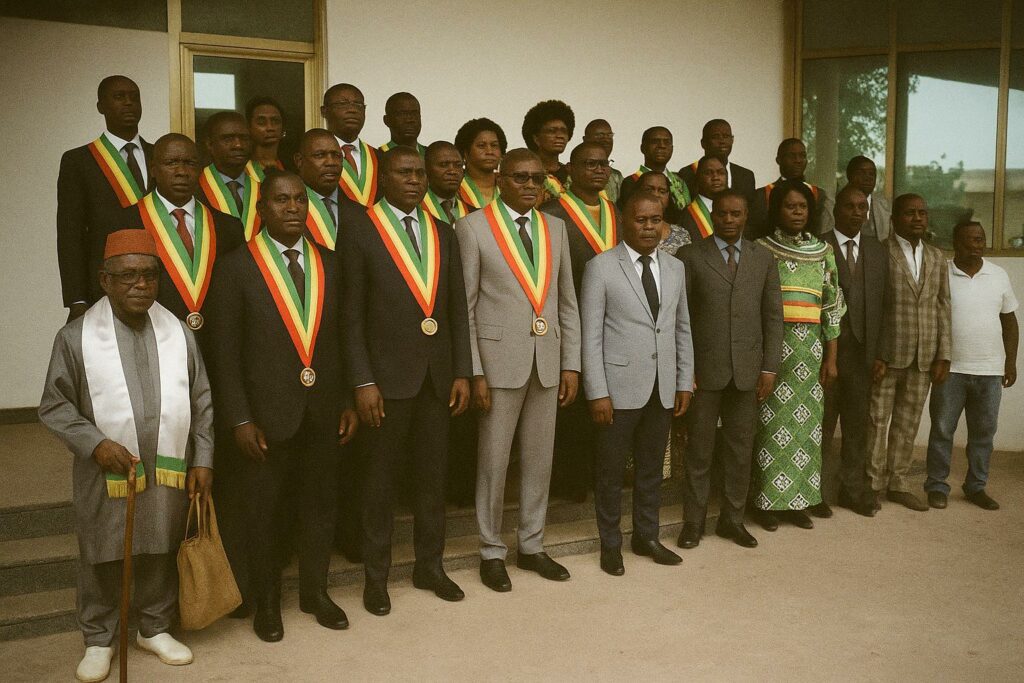A budgetary needle in the Pool haystack
The quietly contested vote in Kinkala on 23 June, resulting in a 2025 operating budget of 979 267 949 FCFA (about USD 1.6 million), might look parochial on paper; yet, it encapsulates the Republic of Congo’s wider struggle to translate constitutional decentralisation into credible fiscal autonomy. Local council president Michel Bouboutou Mampouya called it an “austerity budget”, a phrase that immediately raised eyebrows in Brazzaville’s Ministry of Finance, where officials have long argued that local governments must first demonstrate absorption capacity before requesting larger transfers.
The arithmetic of austerity
Digging beneath the headline figure, only 41 percent of the envelope is projected to come from locally generated fees and levies, the remainder relying on central transfers that historically arrive late or in truncated form, according to a 2023 UNDP diagnostic on Congolese collectivités. Pool’s councillors therefore opted for a defensive posture: salaries for essential staff will be met, basic maintenance of feeder roads will proceed, yet ambitions for new classroom blocks or rural clinics have been postponed. Mampouya’s insistence that the budget must nonetheless “give satisfaction to the population” (ACI, 26 June) betrays the tightrope he must walk between fiscal realism and public expectation.
Decentralisation at the crossroads
The Pool episode unfolds against national debate on the 2003 Decentralisation Law, whose revision is currently before the Senate. International partners such as the World Bank, in its 2022 Systematic Country Diagnostic, argue that over-centralisation has dampened regional growth. Yet the Ministry of Territorial Administration insists that a gradualist approach is necessary to prevent elite capture at the local level. Pool’s modest budget thus becomes a litmus test: if basic services can be delivered transparently under fiscal restraint, advocates of greater autonomy gain new ammunition; failure would empower sceptics in Brazzaville who see local councils as mere vehicles for patronage.
Cross-border markets as engines of integration
Beyond spreadsheets, councillors adopted a landmark deliberation establishing the Ngabé-Kwamouth trans-boundary fair on the banks of the Congo River. The initiative resurrects dormant trade routes linking Pool’s Ngabé district with Kwamouth in the neighbouring Democratic Republic of Congo. According to regional trade analyst Carine Okondzi, daily informal exchanges in agricultural produce already exceed FCFA 120 million during peak harvest months. Formalising the fair could multiply that figure and embed a culture of legal compliance. The decision aligns with the Central African Economic and Monetary Community’s 2021 strategy on corridor development, suggesting that a seemingly local ordinance may reverberate across CEMAC’s integration agenda.
Livestock governance and social peace
Equally significant, though less headline-grabbing, is the new by-law regulating cattle circulation and penalising animal stray. In provinces scarred by farmer-herder clashes from Cameroon to South Sudan, early regulation is often cheaper than post-conflict mediation. Pool’s authorities have taken note: evidence compiled by the Congolese NGO Observatoire des Conflits Ruraux records a fourfold increase in disputes over pasture since 2019. By institutionalising designated grazing corridors and fines for negligent herders, the council hopes to avert copy-cat violence. Colonel Léonidas Mottom Mamoni, prefect of Djoué-Léfini, warned during the session’s closing ceremony that “social cohesion is cheaper than riot police”—an aphorism that rings true for treasury officials scrutinising security expenditures.
Diplomatic ripples and regional implications
While Pool’s budget barely wp-signup.phps on global macro-economic radars, its underlying decisions feed into larger diplomatic narratives. European Union envoys, currently negotiating a 2024-2027 budget-support package with Brazzaville, have placed decentralisation performance indicators at the heart of disbursement triggers. Similarly, the African Development Bank’s forthcoming Country Strategy Paper earmarks USD 65 million for local infrastructure precisely in departments able to demonstrate credible budget execution. Success in Pool could unlock a multiplier effect; mismanagement could freeze external flows and complicate Congo’s delicate debt renegotiations with Chinese lenders, estimated at USD 5.4 billion by the Institute of International Finance.
A cautious optimism amid structural constraints
Political heavyweights present in Kinkala—prefects Jules Mounkala Tchoumou and Léonidas Mottom Mamoni—injected a note of realism, reminding councillors that fiscal discipline must coexist with innovative revenue mobilisation. Whether through digital tax collection on riverine sand exports or public-private partnerships for market sheds, Pool will need more than rhetorical austerity. Yet the session’s decorum and cross-party consensus provide a rare vignette of constructive local politics in a region often caricatured for its security scars of the early 2000s. If the 2025 budget does indeed “hold until the end” as Mampouya pledges, it could serve as a modest but meaningful precedent for Congo’s wider decentralisation experiment.

